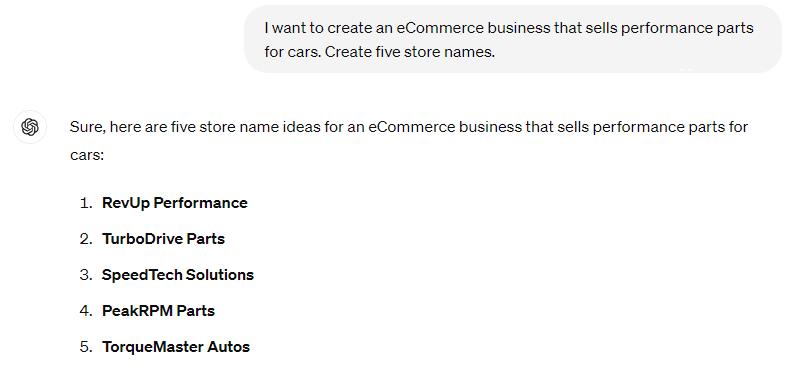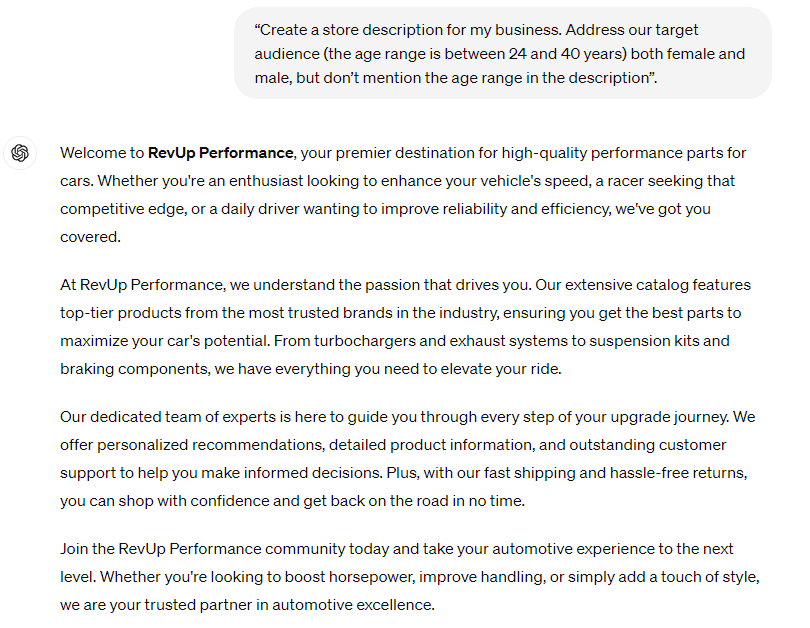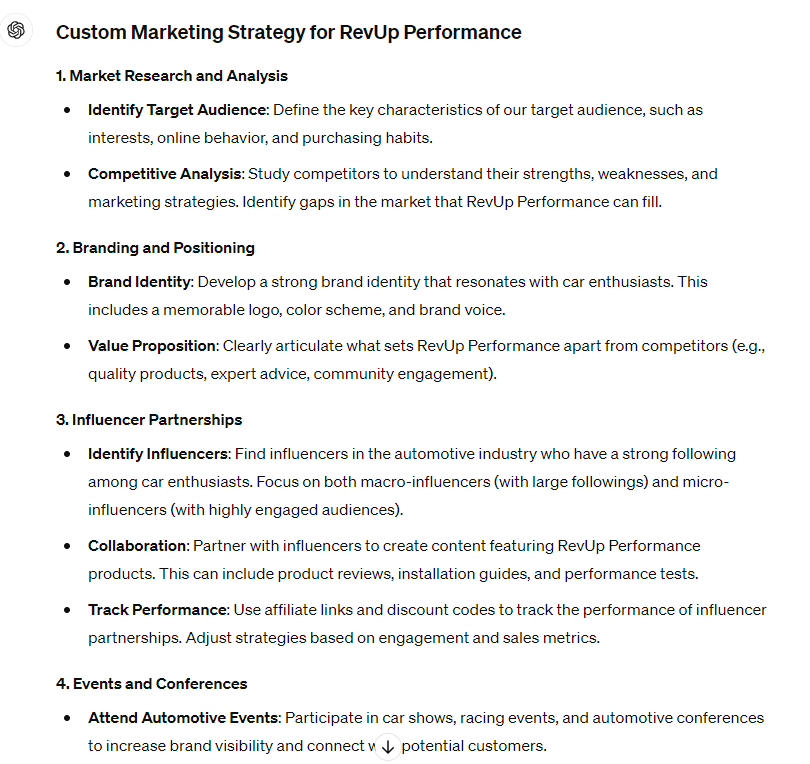In the modern digital world, businesses are looking for new ways and opportunities to automate mundane manual processes and improve their customer’s online experiences and buying journeys. In this aspect, one significant breakthrough came in the form of AI models, most notably ChatGPT, which has rewritten the way people approach digital strategies.
How can ChatGPT work for eCommerce? In this article, we take a closer look at how this clever AI model can help you streamline your online retail operations, making you stand out from your competition.
ChatGPT for eCommerce: What Is It?
ChatGPT is essentially a language-processing artificial intelligence model that’s capable of understanding human inputs and generating text that closely resembles standard human conservation. As such, it can help online retailers generate customer-centric content at a scale that’s remarkably close to human-written content.
On that note, we have to disclose that GPT-4 represents a massive leap in terms of responding to prompts and nuanced dialogues when compared to GPT-3, so if you are thinking about using generative AI in your eCommerce endeavors, using GPT-4 would be the definitive way to go.
The Benefits of Using ChatGPT in Your eCommerce Strategy
Customer experience in eCommerce is paramount, and generative AI can help in a few ways:
Better Customer Services
Good customer service has always been critical for achieving success in eCommerce. As technology advances, people expect effective and fast responses to their queries or concerns. GPT-powered chatbots are able to provide continuous customer service, automatically responding to queries wherever in the buyer journey, whenever required.
The fast response greatly reduces customer waiting times, while also freeing up human customer service reps who can deal with more complex customer concerns or complaints. What this means is that while AI will do a terrific job at handling common problems and complaints, there will always be a few complex situations that will require human assistance, so please, don’t forget that when crafting your strategy.
Automating Operational Tasks
AI can also be of immense help in automating repetitive tasks that can otherwise take up valuable time and resources. Artificial intelligence can help with order tracking, providing regular shipping status updates, answering frequently asked questions, and so on. This will also free up more human resources, enabling your staff to concentrate on more creative endeavors.
More Personalized Recommendations
In eCommerce, GPT-powered personalized suggestions enhance the shopping experience and boost purchase potential. GPT chatbots excel by analyzing diverse customer data like browsing history and past purchases. Leveraging this data, they offer tailored recommendations, such as suggesting workout gear to a supplement-buying customer browsing sports equipment. This customization elevates shopping enjoyment and increases the likelihood of additional purchases. Moreover, these chatbots continually learn and adapt, refining recommendations as customers engage further with the platform.
Improved Sales and Marketing
Generative AI in eCommerce can also be helpful in generating leads. Chatbots can initiate conversations with visitors on your site and can get them started in your sales funnel. Bots may also gather contact information which can be later used for email marketing and retargeting purposes.
AI can also help in the later stages of a customer’s journey, as software can provide detailed info on products, make comparisons, help with checkout, and make personalized recommendations.
Regarding marketing, generative AI can also be a massive help in your marketing strategy, as you can create content marketing assets at scale. You can also quickly produce different iterations of the same content type to create more personalized messaging, targeting different customer groups who are at varying stages of the customer journey.
AI Makes Better Sense of Data
Making data-driven decisions is also a crucial part of running an online retail store – it’s not just something reserved for ecommerce development services. AI can also help you analyze your existing and new customer data, gather insights, and identify user behavior patterns, and turn that information into actionable recommendations.
Having such insights at your fingertips can help you be more efficient in your marketing strategies and your personalization efforts, and can help you improve your decision-making processes overall.
ChatGPT for eCommerce: Where Does AI Fall Short?
Even though AI solutions are valuable tools, they aren’t yet clever enough to replace humans completely. There are still quite a few aspects in which humans have the upper hand:
- Handling complex queries: Most chatbots will do fine with responding to common customer questions but might struggle with exceptional situations, as they lack personal experience and human critical thinking to address these situations.
- No emotional intelligence: Humans can even understand nuances in written form, which is crucial during sensitive conservations. AI solutions like ChatGPT lack that emotional touch, sometimes misinterpreting customer interactions and intent.
- Negotiation in chat: Human negotiators leverage cultural understanding and other nuances for successful outcomes, whereas ChatGPT is still learning to navigate negotiation complexities.
- Creative efforts: Humans outshine ChatGPT in generating original, innovative ideas for marketing and visual content, as their creativity adds a unique touch that AI struggles to replicate.
- Decision-making in unpredictable scenarios: Humans excel in making judgments in unpredictable situations, considering intuition and ethics, while ChatGPT performs well in structured scenarios but may falter in adapting to ambiguity.
- Making sense of cultural context: While ChatGPT and AI solutions can be trained in different languages, they lack a human-like understanding of cultural diversity; thus, humans are better equipped to grasp and adapt to the subtleties of various cultural nuances.
- Establishing meaningful connections in chat: Humans offer authentic connections through shared experiences and personal engagement, whereas ChatGPT, despite its capabilities, can’t replicate the depth of human connection customers seek from brands.
ChatGPT Prompts for eCommerce: Power Your Store With AI
Now that you have a better understanding of the basic advantages and possible drawbacks of using AI, let’s see how you can leverage generative artificial intelligence to come up with a potential store concept based on the prompts we give to it.
Naming The Store
First, give ChatGPT the basic info about what you want to sell and a basic description for interested visitors.
Use a prompt such as this:
“I want to create an eCommerce business that sells performance parts for cars. Create five store names.”

If you’ve used generative AI before, you probably know that some of the options can sound a bit pretentious or even funny. Still, you want something catchy, so ask the interface to help you brainstorm ideas until you find something catchy enough that will stay in your target audience’s head.
Once you have a name, ask ChatgPT to come up with a store description:
“Create a store description for my business. Address our target audience (the age range is between 24 and 40 years) both female and male, but don’t mention the age range in the description”.

Create A Refund And Privacy Policy
Next, ask the solution to create a refund and a privacy policy. Make sure to read both and add any additional info that’s required and any legal information if required.
“Create a privacy policy.”
“Create a refund policy.”

Naturally, feel free to feed additional information into the interface through your prompt on your first go to avoid generating the same thing over and over again with little adjustments.
Creating a Marketing Strategy
Next up, you can ask ChatGPT to come up with a marketing strategy for your shop.
“Create a custom marketing strategy step by step for the shop and integrate modern eCommerce solutions as well.
Consider the following marketing strategies:
- Influencer partnerships
- Events and conferences
- Paid advertising
- Referral program creation
- Customer engagement

If something’s unclear, you can always ask ChatGPT to expand on a given step or strategy. Still, remember that it’s not the best idea to fully rely on what the solution tells you to do with your business, but it’s definitely worth a shot, especially if you want to brainstorm ideas. Additionally, you can always use AI prompt libraries to explore even more ideas.
You can also use ChatGPT to help you brainstorm keywords, email marketing campaigns, content strategies, social media content ideas, and more or less everything regarding your written digital assets. For the most part, Generative AI can help you to produce content at scale, which you can quickly implement into your strategies and daily operations.
AI Is Here to Stay in eCommerce
Online retailers should know that ChatGPT is only one AI solution that can be used to enhance customer experiences. There are several chatbot, automation, and analytics solutions you can choose from which will help you streamline repetitive and mundane processes while aiding you in making smarter business decisions and creating more refined marketing and reputation management strategies.
And as AI technology continues to evolve, these solutions will give better and better recommendations. In such a scenario, it will be almost mandatory to learn how to implement them for any online retailer who wants to stay competitive.
However, it’s still imperative to comb through the content that ChatGPT generates. Double-check privacy and refund policies, blog posts, and email marketing flows. Remember, the end results will be only as good as the prompts you use. Still, ChatGPT and other AI solutions are just tools and still need human revision.





